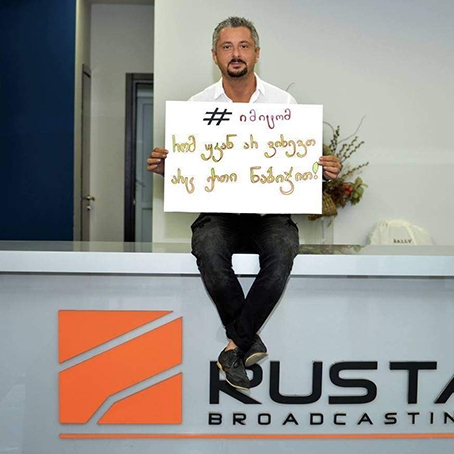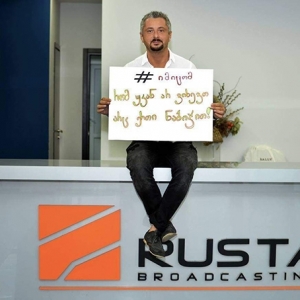Rustavi 2 Case: Attempted Subordination of Georgian Media?
Georgia’s largest TV Company and the country’s leading media organization Rustavi 2 is under attack. 100% of the company’s shares were sequestered on behalf of Georgian businessman Kibar Khalvashi- who filed a lawsuit to attempt to regain his share of the company on August 7. The dispute concerning the broadcaster has attracted nationwide concern.
Along with Khalvashi, two founders of Rustavi 2, Jarji Akimidze and Davit Dvali, released a statement subsequently on the asset freezing, citing that the broadcaster has been strictly controlled by the United National Movement, the main opposition party in Georgia.
“Rustavi 2 [currently] works for fulfilling the UNM’s orders so it has nothing to do with free media” the statement said. According to them, there are no alternatives for the legislative process, which serves to establish fairness in a democratic society.
In response, Nika Gvaramia, the company’s General Director, comments that both Akimidze and Dvali represent voices of the government calling them ‘new pseudonyms of the government.’ Gvaramia accuses the entire government and the Georgian Dream Coalition in general of attacking free media and secure freedom of speech.
Many Georgians, including those who live abroad, have launched a social media campaign in support of the television station which has endured a number of attacks from different governments throughout its more than two decades of operation. Thousands of supporters have appeared on social networks with messages of support for the values they believe Rustavi 2 is based on.
The story of Rustavi 2 is widely compared to the case of Imedi TV back in 2007, which played a considerable part in Georgia being refused MAP at the Bucharest Summit and the former ruling party paid a high price in the end.
The Rustavi 2 case is now attracting international attention. The OSCE Representative on Freedom of the Media Dunja Mijatovi assesses that excessive court measures against the Georgian television channel Rustavi 2 based on an ownership dispute may pose a threat to free media and media pluralism.
According to her, the court injunction may negatively affect Rustavi 2’s ability to operate freely. “The decision is disproportionate, excessive and may constitute a threat to media pluralism in Georgia,” declared Mijatovi.
The OSCE Representative who has raised the case of Rustavi TV 2 with the authorities in Georgia on several occasions in the past, called on the authorities to do their utmost to ensure media pluralism in the country.
At the same time, Georgian civil society institutions such as Media Development Foundation (MDF), Georgia’s Reforms Association (GRASS) and Tolerance and Diversity Institution (TDI) support Rustavi 2. “The signer organizations support media freedom in Georgia and will carefully observe further developments around Rustavi 2” said a statement.
Analysis: While the Georgian government claimed that after their victory in the 2012 elections, the media has become free, the question of whether the Rustavi 2 case is an attempt at subordination of the Georgian media being widely asked in Georgian society.
Does the Georgian Dream coalition follow the very principles of democracy underpinning Georgia’s European and Euro-Atlantic path? This will be known once the verdict of the court is delivered.
Zviad Adzinbaia












